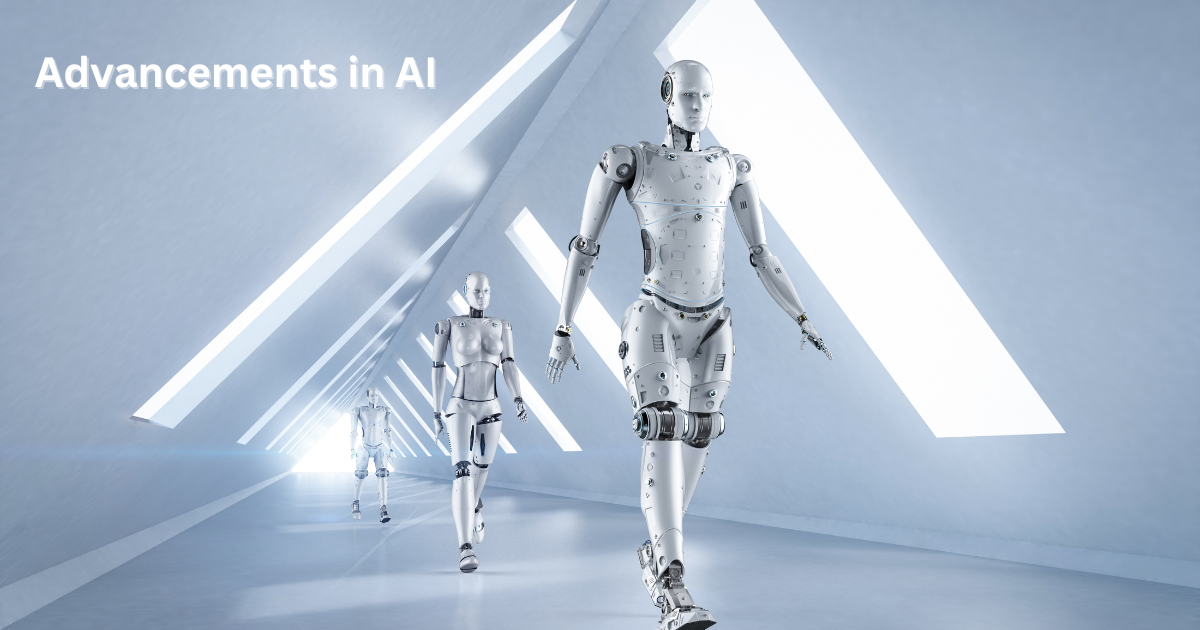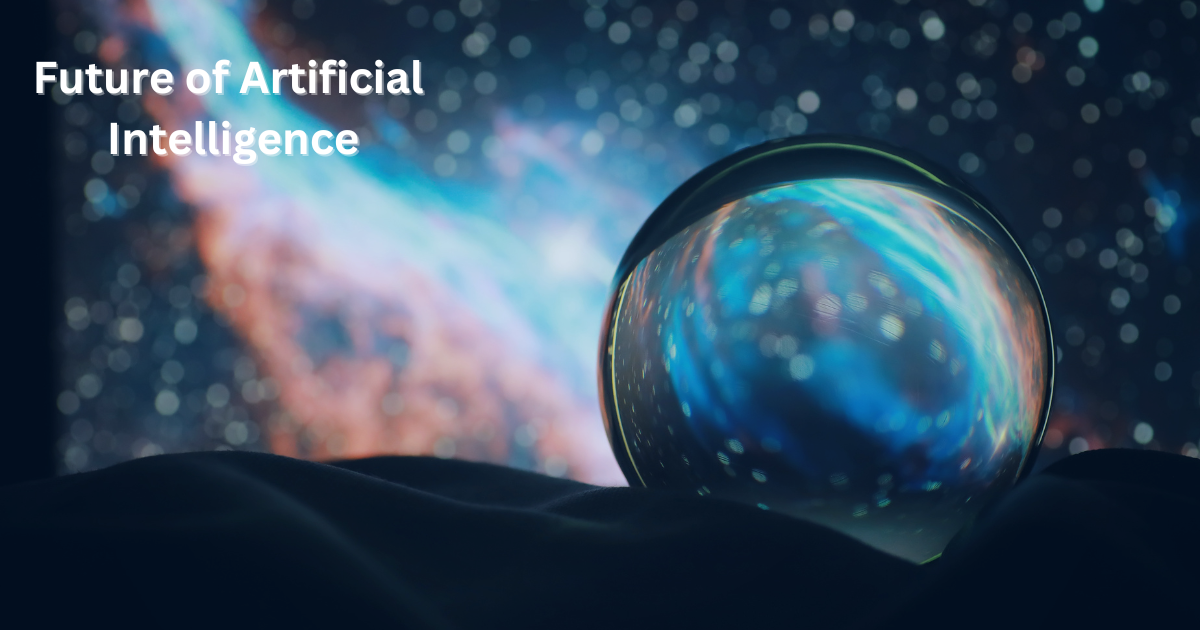Future of Artificial Intelligence: Latest Predictions
Artificial Intelligence (AI) is one of the most exciting and emerging technologies of our time. Artificial Intelligence aims to create intelligent machines that can perform tasks that typically require human intelligence. These are understanding natural language, recognizing faces, making decisions, and driving cars. The future of artificial intelligence is very bright. AI algorithms are at the core of artificially intelligent technology. They are responsible for enabling AI systems to learn from data and make predictions or decisions based on that data.
Various fields are using artificial intelligence. These include customer service, healthcare, finance, retail, and manufacturing, and it is transforming the way these industries operate. AI-enabled systems are helping businesses to improve efficiency, increase productivity, and enhance customer experience. This is done by providing real-time insights and personalized recommendations.
Brief history and evolution of AI
The history of Artificial Intelligence (AI) dates back to the early 1950s. Computer scientists first began to explore the possibility of creating machines that could mimic human intelligence. The term “Artificial Intelligence” was coined by John McCarthy, a computer scientist at Dartmouth College, in 1956.
Early AI research focused on developing systems that could perform logical reasoning. This consisted of the development of symbolic AI, which used rules to represent knowledge and perform logical inference. However, these systems were limited in their ability to learn and adapt to new situations.
In the 1960s, AI research shifted towards the development of machine learning algorithms. These could learn from data and improve their performance over time. The development of neural networks and deep learning algorithms in the 1980s and 1990s enabled machines to recognize patterns. Then it made decisions based on complex data sets.
Despite these advancements, AI technology was still limited in its ability to interact with the real world. In the 1990s, researchers began to explore the development of AI systems that could interact with the physical world. This featured robots and autonomous vehicles. This led to the development of robotics and natural language processing technologies.
In the early 2000s, advancements in AI-enabled the development of intelligent personal assistants, such as Apple’s Siri and Amazon’s Alexa. These AI systems use natural language processing and machine learning algorithms to understand and respond to user queries.
Today, AI is being applied in various fields, including healthcare, finance, transportation, and manufacturing, among others. The development of AI has also led to significant improvements in data analytics and predictive modeling. Thus, enabling organizations to make more informed decisions.
The current state of AI technology and its applications
The current state of AI technology is rapidly advancing, with new breakthroughs and applications emerging every day. One area where AI is making significant strides is facial recognition technology. AI algorithms can now recognize and identify individuals in real-time, making them a valuable tool for security and law enforcement.
AI has also surpassed the realm of science fiction and is now a reality in many areas of our daily lives. The development of intelligent personal assistants has made it possible for us to interact with our devices using natural language processing. Autonomous driving technology, which uses AI to navigate vehicles, is becoming increasingly prevalent.
AI research continues to push the boundaries of what machines can do. Researchers are exploring new technologies, such as quantum computing, to develop more advanced AI algorithms. These advancements are paving the way for new applications of AI that were previously thought impossible.
The applications of AI are diverse and span various industries. In healthcare, AI is being used to assist with medical diagnoses and drug development. AI algorithms can analyze vast amounts of patient data and help doctors make more informed decisions. AI is also being used to develop new treatments and therapies, such as personalized medicine.
Looking ahead, the long-term applications of AI are vast and have the potential to transform society. In finance, AI is being used to develop new investment strategies and fraud detection algorithms. In manufacturing, AI is being used to optimize production processes and improve quality control.
Advancements in AI
Artificial Intelligence (AI) has undergone significant advancements in recent years. Several key technologies have emerged as critical components of modern AI systems. These technologies include Deep Learning, Machine Learning, Natural Language Processing (NLP), and Robotics.
1. Deep Learning
Deep Learning is a subset of Machine Learning. This involves training neural networks with large datasets to identify patterns and make decisions based on complex data. Deep Learning algorithms have revolutionized the field of computer vision.
Thus, enabling machines to recognize and classify images and videos with increasing accuracy. Deep Learning has been used to develop autonomous vehicles, facial recognition technology, and voice recognition systems, among other applications.
2. Machine Learning
Machine Learning is a broader field that involves training algorithms to learn from data and improve their performance over time. The algorithms are used in various applications, such as recommendation systems, fraud detection, and predictive analytics. One of the key benefits of Machine Learning is its ability to improve accuracy and efficiency. Over time, the algorithm is exposed to more data.
3. Natural Language Processing (NLP)
Natural Language Processing (NLP) is another key technology in the field of AI. NLP involves teaching machines to understand and interpret human language, including speech and text. NLP algorithms are used in intelligent personal assistants.
Like, for example, Siri and Alexa, as well as in chatbots and language translation software. NLP is a challenging field, as human language is complex and context-dependent.
4. Robotics
Robotics is another area where AI has made significant advancements in recent years. Robots are being developed to perform a wide range of tasks, from manufacturing to healthcare. AI algorithms are used to control the movement and actions of robots.
Thus, enabling them to operate autonomously and interact with the world around them. Robotics is expected to play an increasingly significant role in society in the coming years. This is because of the fact that robots become more advanced and capable.
Opportunities for AI
Artificial Intelligence (AI) has the potential to transform a wide range of industries and create new opportunities for businesses and individuals. Here are some of the key opportunities for AI in healthcare, manufacturing, finance, retail, and education:
1. Healthcare
AI has the potential to revolutionize healthcare by improving medical diagnoses, developing new treatments, and enabling personalized medicine. AI algorithms can analyze vast amounts of patient data.
This includes medical records and genetic information, to identify patterns and make more accurate predictions. AI is also being used to develop medical imaging systems, such as MRI and CT scans. This can detect early signs of disease and improve treatment outcomes.
2. Manufacturing
Artificial Intelligence is being used to optimize manufacturing processes and improve quality control. AI algorithms can analyze data from sensors and machines to identify patterns and predict maintenance needs, reducing downtime and improving productivity. AI is also being used to develop autonomous robots. This can perform a wide range of tasks, from assembling products to inspecting equipment.
3. Finance
AI is being used to develop new investment strategies, fraud detection algorithms, and customer service systems. AI algorithms can analyze vast amounts of financial data. This includes market trends and customer behavior, to identify patterns and make more accurate predictions. AI-powered chatbots and virtual assistants can also provide personalized financial advice and support, improving customer satisfaction and retention.
4. Retail
AI is being used to personalize the customer experience, optimize inventory management, and improve supply chain logistics. AI algorithms can analyze customer data, such as purchase history and browsing behavior, to provide personalized product recommendations and promotions. Artificial Intelligence is also being used to develop autonomous delivery robots and drones to improve delivery times and reduce costs.
5. Education
AI is being used to improve student learning outcomes and personalize the educational experience. AI algorithms can analyze student data, such as test scores and learning styles. This is done to develop personalized learning plans and provide targeted support. AI-powered tutoring systems can also provide real-time feedback and adapt to students’ individual needs.
Future of Artificial Intelligence: Predictions and Forecasts
The future of Artificial Intelligence (AI) is exciting and holds immense potential for transforming society in many ways. Here are some of the predictions and forecasts for the future of Artificial Intelligence:
1. Increased automation
AI will continue to transform industries by automating processes and tasks previously done by humans. This will lead to increased efficiency, productivity, and cost savings across various industries.
2. Improved personalization
AI will enable more personalized experiences for individuals in areas such as healthcare, retail, and education. By analyzing vast amounts of data, AI algorithms will be able to provide tailored recommendations and solutions. They are customized to an individual’s needs.
3. Enhanced safety and security
AI will improve safety and security in many areas, such as transportation and cybersecurity. Self-driving cars and trucks, for example, will reduce accidents caused by human error. While AI-powered cybersecurity systems will be better equipped to detect and prevent cyber-attacks.
4. Advancements in healthcare
AI will revolutionize healthcare by improving medical diagnoses, developing new treatments, and enabling personalized medicine. AI-powered medical devices and systems will improve patient outcomes and reduce healthcare costs.
5. Increased collaboration between humans and machines
AI will continue to enable greater collaboration between humans and machines, leading to new forms of work and productivity. By automating repetitive tasks, humans will be able to focus on more creative and higher-level tasks. Thus, leading to greater innovation and job satisfaction.
6. Ethical considerations
As AI becomes more prevalent, there will be an increased need to consider ethical implications. This includes ensuring fairness and equity in AI decision-making, protecting personal privacy, and addressing concerns about job displacement.
7. Continued research and development
AI research will continue to advance, leading to new breakthroughs and innovations in the field. Areas of focus include deep learning, natural language processing, and robotics, among others.
Conclusion
Artificial Intelligence (AI) has come a long way since its inception and continues to evolve at a rapid pace. From its early days to its current applications in various industries, AI has shown immense potential to transform society. Today, AI is being used to automate processes and improve efficiency and productivity. It also provides personalized experiences, enhances safety and security, and revolutionizes healthcare, among other things.
The future of Artificial Intelligence is even more exciting, with continued advancements in deep learning, natural language processing, and robotics. However, it is important to consider the ethical implications and ensure that it is developed and used responsibly. This includes ensuring fairness and equity in AI decision-making, protecting personal privacy, and addressing concerns about job displacement.
Frequently Asked Questions (FAQs)
1. What is the future of AI in 2030?
Experts predict that significant advancements in machine learning, natural language processing, and computer vision will mark the future of AI in 2030. Our daily lives will see increased integration of AI, with smart homes and autonomous vehicles becoming more common. Progress in areas such as healthcare, finance, and education will continue, where AI can help to improve outcomes and drive efficiencies.
2. Is artificial intelligence in demand in future?
Artificial intelligence is expected to have high demand in the future. With the increasing adoption of automation and machine learning, AI is becoming more prevalent in various industries. In addition, the growth of big data and the need to process and analyze vast amounts of information will drive the need for AI technologies and expertise. As the technology becomes more pervasive across different sectors, the demand for AI professionals is expected to continue to grow.
3. Why is AI the future of growth?
AI’s potential to unlock new efficiencies and drive innovation across different industries makes it a technology that is seen as the future of growth. With the ability to analyze vast amounts of data and identify patterns and insights that would be difficult for humans to discern, AI can help businesses make more informed decisions and improve outcomes.
As AI technology continues to evolve and become more accessible, businesses and society expect it to grow and impact. Additionally, AI can automate repetitive tasks and free up employees to focus on more complex and strategic work.












